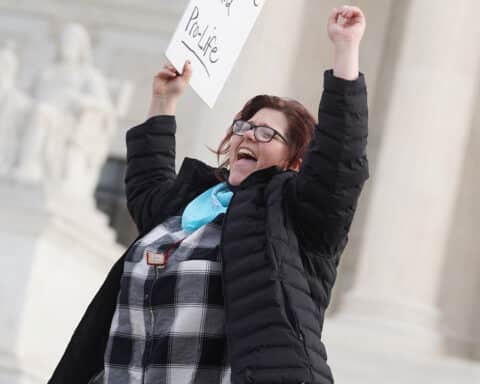WASHINGTON (OSV News) — With South Carolina Gov. Henry McMaster signing into law a bill banning most abortions in the state May 25, there are now 25 U.S. states that “have laws to protect life between conception and 12 weeks,” said Marjorie Dannenfelser, president of Susan B. Anthony Pro-Life America.
She made the comments in a statement praising the South Carolina bill’s approval, although a day after McMaster signed the measure, a judge put a temporary hold on the law while the state Supreme Court can review it.
“Not even a full year after Dobbs, the pro-life movement can celebrate that we are at the halfway point in the states thanks to the incredible momentum we have seen in North Carolina, South Carolina and Nebraska in just the last week and a half,” she said, referring to the U.S. Supreme Court’s ruling in Dobbs v. Jackson Women’s Health Organization in 2022.
The group tallied states that have either abortion limits in effect or have limits pending legal challenges in its count, a spokesperson told OSV News.
However, in South Carolina, Judge Clifton B. Newman, an at-large judge of the South Carolina Circuit Court, put a temporary hold on that state’s ban on most abortions until the state Supreme Court can review it.
South Carolina’s Fetal Heartbeat and Protection from Abortion Act (SB 474) bans most abortions after cardiac activity can be detected, a point before many women know they are pregnant, effectively banning most abortions in the state. The bill does include exceptions for rape, incest, life of the mother, as well as for a fatal fetal anomaly. A previous South Carolina law permits abortion until 22 weeks gestation. The new law marks a significant change to the legality of abortion in one of the few Southern states that had not previously added restrictions to the procedure after the U.S. Supreme Court overturned Roe v. Wade last summer with its Dobbs decision.
In a May 25 statement, McMaster, a Republican, announced that he signed the Fetal Heartbeat and Protection from Abortion Act into law and said it “will begin saving the lives of unborn children immediately,” but in ordering a temporary hold on the law a day later, Newman said the “status quo should be maintained” until the higher state court weighs in.
The South Carolina Supreme Court previously struck down a similar six-week abortion ban.
Also, opponents of the ban filed a legal challenge. Planned Parenthood South Atlantic, Greenville Women’s Clinic, and two physician-plaintiffs filed a lawsuit in state court seeking to block the bill the same day McMaster signed it.
Jenny Black, president and CEO of Planned Parenthood South Atlantic, said in a statement that South Carolina lawmakers “have once again trampled on our right to make private health care decisions, ignoring warnings from health care providers and precedent set by the state’s highest court just a few months ago.”
“The decision of if, when, and how to have a child is deeply personal, and politicians making that decision for anyone else is government overreach of the highest order,” Black said. “We will always fight for our patients’ ability to make their own decisions about their bodies and access the health care they need. We urge the court to take swift action to block this dangerous ban on abortion.”
If the new law were to go into effect, it would mean that every Southern state in the U.S. except Virginia has moved to restrict abortion since the Supreme Court issued its decision in Dobbs vs. Jackson Women’s Health Organization last June.
The South Carolina Catholic Conference has supported the bill, praising lawmakers for advancing it in a post on their website.
“The Fetal Heartbeat Act is the strongest pro-life bill the state General Assembly has ever passed,” the post said. “The Catholic Conference thanks Senate leadership for coming together to pass a life-affirming bill that protects babies and their mothers. We anticipate the abortion industry will file an immediate legal challenge. The battle will now move to the courts. For now, this is an incredible victory for life in the Palmetto State. Praise be to God!”
In her statement, Dannenfelser, who leads SBA’s efforts to elect candidates to public office who oppose abortion, said South Carolina moved to “protect babies with a heartbeat.”
“The way Gov. McMaster and pro-life legislators persisted to get a heartbeat protection across the finish line this year is a reflection of their compassion, respect for the people’s will, and adherence to the science,” she said. “Every year, thousands more irreplaceable South Carolinians will be allowed to live and discover that unique purpose in this world which only they can fulfill.”
Earlier in May, next door to South Carolina, the GOP-controlled Legislature in North Carolina also overrode Democratic Gov. Roy Cooper’s veto of a 12-week bill. In Nebraska, Republican Gov. Jim Pillen signed a bill May 22 that both bans abortion at 12 weeks of pregnancy and restricts certain types of medical or surgical gender reassignment procedures for minors who identify as transgender.





